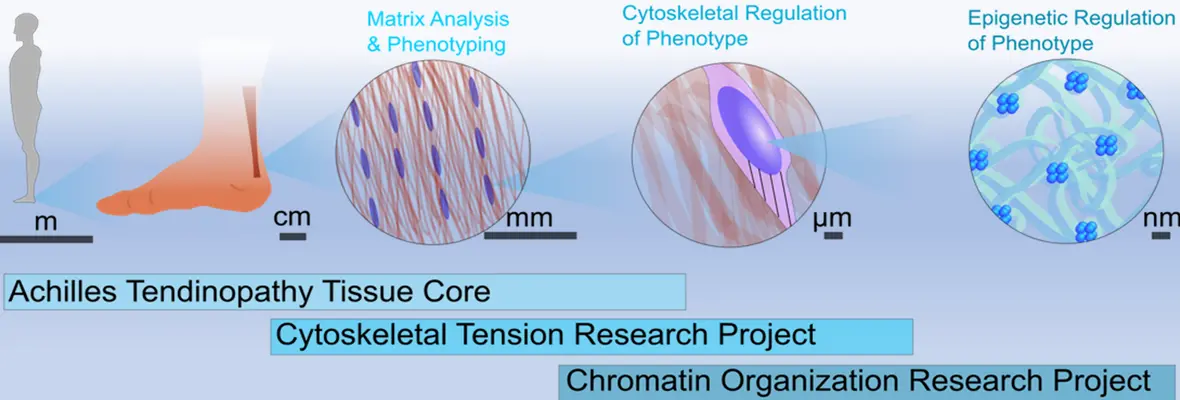Welcome to the Penn Achilles Tendinopathy Center of Research Translation!
In the News:
What Indiana Pacers’ James Wiseman Can Expect After Achilles Tear!
Read Full Article in Field House Files
Expert: A return this season for James Wiseman is possible, but not likely!
Read Full Article
The Penn Achilles Tendinopathy Center of Research Translation (PAT-CORT) at the University of Pennsylvania will foster fundamental discoveries to guide clinical translation, as well as develop and employ novel translational resources, models and technologies, to address the highly significant research and clinical challenge of Achilles tendinopathy. Despite the high frequency and increasing prevalence of tendinopathy in young and old patients, and the significant pain and disability that arises from this condition, as well as the associated high cost to society, effective treatment modalities have stagnated over the last two decades. This is due to the lack of fundamental understanding of tendon disease etiology and pathogenesis, which limits development of novel treatment modalities. At present, beyond surgical intervention for late-stage disease, the only approved clinical therapy involves physical interventions via controlled rehabilitation mechanical loading of the tendon. While efficacious in some patients, outcomes of this intervention do not stem disease progression in most patients. Given the central mechanical role of the Achilles tendon, and the critical role of mechanical loading and mechanobiology on tendon cell homeostasis, it is critical that we develop and expand our understanding of the role of mechanical forces in disease onset and progression to optimize existing and inform new treatment strategies. Our PAT-CORT Center is uniquely positioned with a critical mass of multidisciplinary scientists and clinicians with strong interest and expertise in these and related areas.
The Overall goal of the PAT-CORT is to develop new insight and technologies that uncover the mechanobiologic basis of Achilles tendinopathy across length scales, from the nucleus, to the cell, to the tissue microenvironment to patients. We will assess these critical elements during disease onset and progression, informed by both vivo animal models that replicate disease processes and source material and real-world loading data from living human subjects. The PAT-CORT is comprised of four independent and yet interactive elements, including an Administrative Core to oversee and guide interactions and primary Research Projects focused on the transfer of information from the external tendon cell microenvironment through the cytoskeleton (Project 1) and on chromatin remodeling and mechano-epigenetic regulation of tendon cell phenotype (Project 2). Using cells, tissue, and loading information derived from both human and animal tendinopathic models (Tissue Core), these research projects will advance our knowledge of the origins of tendinopathic disease and define new avenues for therapeutic intervention.
Together, our highly interdisciplinary team, innovative tools, and outstanding and interactive Research Projects and Cores will dramatically advance knowledge, develop innovative tools and insight, and provide new directions for translation of novel therapies to treat Achilles tendinopathy.
ACKNOWLEDGING THE PAT CORT
Remember to include reference to support from the Center in your abstracts and publications.
Cite Grant NIH/NIAMS P50AR080581 from the National Institute of Arthritis and Musculoskeletal and Skin Diseases of the NIH.
Support has also been provided by the Perelman School of Medicine at the University of Pennsylvania.
Latest News
-
Penn Medicine News
Thursday, May 2, 2024
A mutation hiding in one unique patient could save others from forming a ‘second skeleton’


